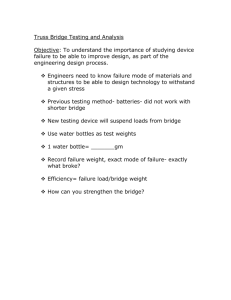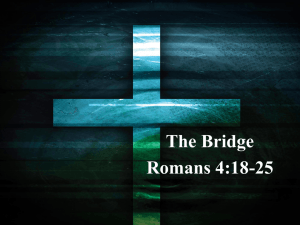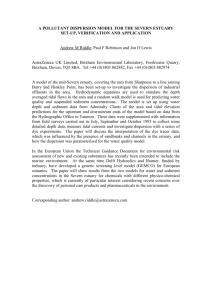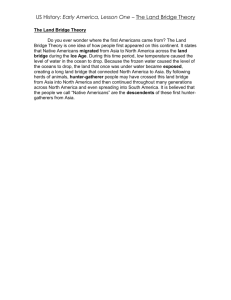here - Solway Firth Partnership
advertisement
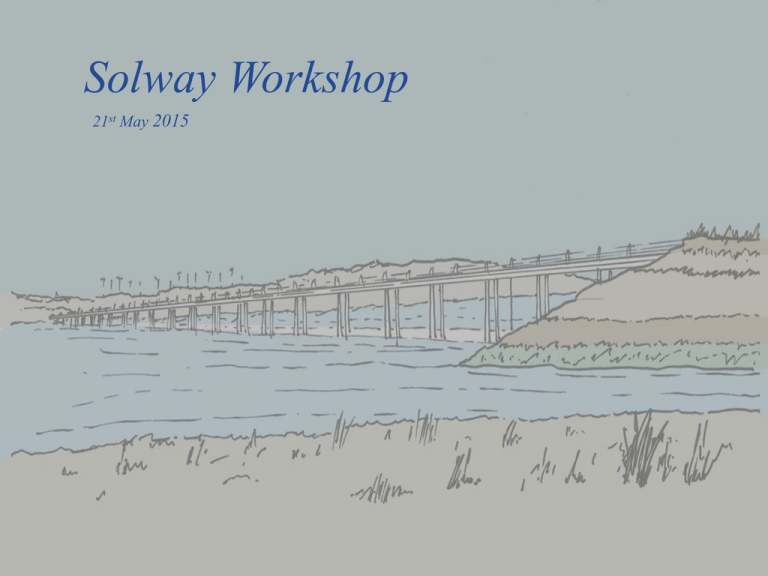
Solway Workshop 21st May 2015 Summary of Solway “electric bridge” workshop On Thursday 21st May a workshop was held at Scottish Enterprise Offices in Dumfries to share the latest thinking on the Electric Bridge tidal energy scheme. The workshop comprised key stakeholders including investors, regulators, community groups and other interested parties. This document captures the feedback from the workshop meetings that will be fed into the prefeasibility study report. The workshop began with a general introduction to the project and a presentation of the concept design. The attendees then split into three groups to work through three questions around the location, design and ownership of the project. The feedback from the three groups was captured in a series of bullet points set out below. The next step will be to develop the scope of the prefeasibility study and obtain funding for the prefeasibility study. Location What do you value about the Solway Estuary…? What could be improved…? Tranquillity, remoteness, migrating birds, habitats, salmon (both the presence and the pursuit of their capture – this has both recreational and commercial aspects), cockling, species diversity (e.g. lampreys, eels), ‘naturalness’ – natural dynamics of the estuary The quiet rural setting, small roads and lack of infrastructure (especially in Cumbria) Better access to the ecology and habitats, including better education and learning opportunities Area needs an economic stimulus - need to better realise the economic benefits of tourism, but this also need to fit into the wider regional economic and tourism offering and jigsaw Better linkage to heritage sites on both sides of the estuary – existing links are very major, busy (e.g. M6, trainlines) Better opportunities and improvements for the community, including lifestyle Considered there are no opportunities to enhance the environment People walk along from Chapel Cross, bird watchers at estuary edge – consider continuing routes Very important environmental site – mudflats, all designations (RAMSAR, SSSI, SAC etc), wading birds U/S River Eden Designated (now in an unfavourable condition) Border Esk – salmon fisheries, businesses reliant on the salmon industry Eel numbers are at an all-time low – what would be the impact on them specifically? Trials only looked at one species of fish, would need to consider all species – not just impact of turbine but impact of a 40m length of culvert Has the number of licences that will be required been considered? Navigation o Tourism – boating – recent study that the boating industry is worth £1m o Navigation access would be needed at all tidal ranges o Coastgauard access o Annan slipway used by Fire and Rescue o Carlisle Canoe Club Environmental designations are significant across the Solway. Visual impact is important and there are some scenic designations further out on the Solway. Tourism is increasingly important and has less prominence as an industry in the area. There is a mood of being “fed up” with wind farms and that tidal energy might be a good alternative. Grid connection Scottish Power is important and understanding the different requirements on the grid. The Eastriggs (Defence Infrastructure Operations) site to the east of Annan is large and a significant opportunity. The project should be used to strengthen the bonds between England and Scotland. Navigation is important as there is a desire to improve Annan harbour and increasing use of the Estuary. Flood risk is an important issue and consideration of any impacts will need consideration. Changes in sedimentation and the geomorphology of the estuary will need to be understood and determined. Relationship with the proposed tidal lagoon at Workington will need to be understood and how they interact. Robin Rigg has had impacts and understanding the cumulative effect of developments in the estuary is important. Fishing is an important sector in the Solway, locally in the estuary and upstream. Flourishing communities that thrive on a diverse set of economic streams. Involvement of children through schools and education is important. Sustainable communities are important and the project will be intergenerational. Sociological impact of the project is important, raising levels of pride. Need to articulate reasons to be involved in the project to the community. Design Causeway, simple bridge or special bridge…? A motor vehicle crossing is unlikely to be in keeping with the wider setting Strong preference for anything ‘iconic’ NOT to be ‘garish’ How about re-building the previous bridge? It will be very important to gauge public opinion on the type of crossing, such as local community groups. This will help inform the important question of who will be using the crossing, and then how will they value it? Opportunity for it to have symbolic resonance as it will cross the border, but also keep in mind that the border doesn’t really ‘exist’ for those in the immediate border area There might be some ‘charm’ in not having 100% access to the crossing (i.e. a causeway) Functional, simple Robust (very exposed) Wind protection – wave design? Breakoffs Viewpoints, glass bottoms – improve access to environment Educational use Way to raise environmental awareness Could a link be made to Solar and Wind Energy? Has socio-economic assessment been done of who would use this? Talk to Chris Little about the wind turbines at East Rigg. What consideration has been given to the shifting sands and how this would affect the causeway, but also the species, change nature of area What access would be available for fish migration at spring tide/neap tide The gates being up at certain periods of high tide would affect food availability, particularly for wading birds, this is a concern 1 mile causeway at a fixed invert level is different to what there is now (discussed only being -0.15m difference now but still felt this would have a significant impact on the mudflats) Would the entrances block up with the shifting sand and require maintenance – what would be the impact of this maintenance? People are interested in construction and will be keen to engage with the project. Design must be sympathetic to landscape but that does not mean simple. The bridge could be a huge tourism attraction if done well. Preference for stunning design but not necessarily iconic. Needs to be owned by the community in the sense of pride rather than just commercial benefit. Bunkhouse at Bowness has been successful in response to cycling and walking community. Learning aspects of the design are important and how we involve children in the project. Environmental art is a growing area in Dumfries and Galloway and this could be a showcase. The bridge could be tactile and playful for people to enjoy along its length. Safety is a concern and the bridge needs to respect the harsh environment of the Solway. Understanding the energy production through visual displays on the bridge. Ownership What would community ownership mean…? Profits not going elsewhere – staying in the local communities, but need a model to distribute any wealth. But the question will also need to be asked – what will the community do with the money? For example, monies are currently paid out from local windfarms but the communities are not sure how to spend or allocate the money. Need to define what the ‘community’ is – is it simply defined by geography/proximity? This will then help to shape the engagement strategy (as well as the commercial strategy). The local community are ‘engageable’ – sessions on the recent Annan Masterplan were well attended, although this needed strong promoting by the Council Need to clarify what ownership means – and the responsibility that comes with it A community body could own and run the scheme? It will be important to highlight that, with this type of scheme, there will be a longer term payback profile – but it will continue to generate profit long after the payback is complete The ageing population demographic of the area is a concern – there is a lack of jobs (blue and white collar), particularly with the decommissioning of Chapelcross. Schemes/opportunities need to be implemented to stimulate/provide jobs. Would need capital investors Could we access development funding pots Need to build the Local Supply Chain Create a Centre of Excellence for supply of the technology around the world Hardest part – share of Community Funds, already starting to fight over it and it isn’t a reality yet, is the selling point Cheaper Electricity? Need to sell the Short Term Benefits o Quicker Connectivity (cycle to work) o Access o Better environmental access Community Pride is key Need early sight of the details of the Social Enterprise Fund, how this could be accessed, could they be involved in setting this up? Partnership needs to be balanced between north and south. Ownership is important but not everything, instilling pride is important. Settling the ownership position before starting is important to avoid rows later. Economic benefits possibly more on north side but needs to be balanced against the capacity of the south side to cope with economic benefits of tourism. Sell the sizzle not the sausage, the bridge may be more of the sizzle than the energy generation. Governance and capacity to administer of commercial benefits is an important issue for local communities.


